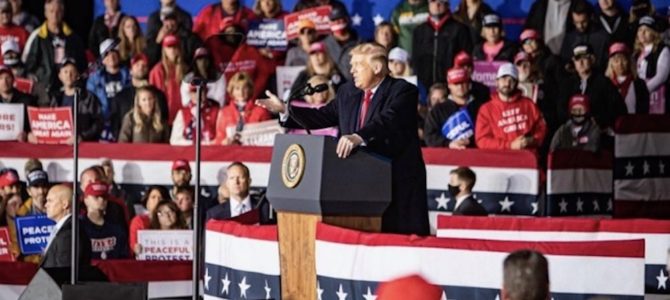Trump has been struggling in Southeast Wisconsin, the suburbs of Madison and Milwaukee that were once solidly Republican. He’s right to energize his core, blue collar, bluedog supporters in Central and Northern Wisconsin, but the real challenge for him is swaying upscale suburban voters who cringe at his tweets and bare-knuckle politics.
Marathon County, known for Central Wisconsin Airport where Thursday’s raucous Trump rally was held, has gone from a swing area to solidly red, thanks to Trump’s America First agenda and emphasis on bringing manufacturing jobs back to Wisconsin. Marathon County voted for Barack Obama in 2008, and was won by Trump in 2016, with Trump taking 56 percent of the vote to Hillary Clinton’s 38 percent.
There is little doubt that Central Wisconsin loves Trump. Residents of neighboring towns and farm communities traveled to Mosinee, a town of only 4,000 people, to get a glimpse of their president walking off of Air Force One to deliver a one and half hour speech Thursday night. People began camping out to get in line at 10 a.m. the day before the rally was scheduled to began at 8 p.m.
Central and Northern Wisconsinites are down-to-earth folks who go to church, hunt, and enjoy a Friday night fish fry. Some live in Wausau, a city of about 40,000 people, others in quiet little towns, and still others on farms some might call “socially distanced,” where the nearest neighbor lives several miles away.
They watched riots break out across liberal cities, but took notice when it came to the blue collar city of Kenosha, Wisconsin. Their top issues are safety, respect for law enforcement, and a fear of the socialist, Marxist ideology animating BLM and Antifa. They want a president that will defend “law and order,” and American values, like the Second Amendment. They are sick of the government overreach during the COVID-19 pandemic. They want to go work, see a movie at the local theater, and go to restaurants. Many of them fear COVID rules will get worse under a Biden administration.
Even Trump supporters in Mosinee expressed concern over Southeastern Wisconsin. Dianne Cameron, from Antigo, Wisconsin, who did not have tickets to the rally but came anyways to be in the excitement, said “The north is for Trump … the south is for Biden.” And in “purple” Wisconsin, there are many people still undecided. Indeed, Central and northern Wisconsin is overall “Trump country,” as the locals call it, while the southeast is shaky to say the least.
Trump has some solid accomplishments he can rightfully talk about to these on-the-fence voters, not the least of which is that his pre-COVID economy delivered the three best economic years in Wisconsin history. A recent poll shows veteran satisfaction with Veterans Affairs soaring above 90 percent. That’s a significant turnaround from the Obama/Biden years that were plagued with scandals and the deaths of veterans languishing on wait lists.
But for suburban voters, he needs to drive home is his decisive role in ending the Kenosha riots. Following the shooting of Jacob Blake, violent riots erupted in the Southern Wisconsin city. Wisconsinites were in shock and horror as the city burned.
The first night of protests were relatively peaceful, but after the second night, it was apparent that law enforcement did not have the people and resources to control the situation. Fire and looting consumed uptown and downtown Kenosha.
Trump reached out to Wisconsin Gov. Tony Evers, extending him an offer for aid, which Evers refused. For three nights, Kenosha experienced dangerous rioting and looting. It wasn’t until three individuals were shot and two died that Evers reluctantly accepted the federal assistance. “It’s pretty darn clear who demonstrated leadership and who did not,” said Rep. Bryan Steil, who represents Kenosha in Wisconsin’s First Congressional district.
Trump established order within 24 hours of Evers giving him the green light. The president also committed to giving $1 million to Kenosha law enforcement, $4 million for small businesses affected by recent unrest, and $42 million for statewide public safety. Right now, delays in delivering the promised federal resources threaten to undermine the goodwill Trump has established with the citizens of Kenosha. The Milwaukee Journal Sentinel has run several stories about it and he would do well to use his executive power to expedite the funds.
If he can get this money quickly into the hands of Kenoshans who were hurt by the riots, he’ll be able to make a good case before the election, by contrasting his can-do executive style against a weak Democratic Gov. Evers and Joe Biden, both of whom have refused to denounce BLM or Antifa by name. It’s fun to be loved in Wisconsin’s Trump country, but to win reelection, the president needs to tie up ends in Kenosha and seal the deal with suburban voters in Southeast Wisconsin.









